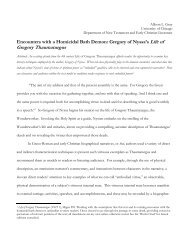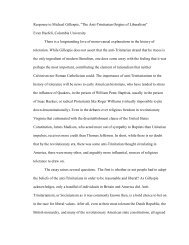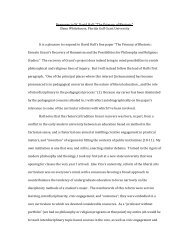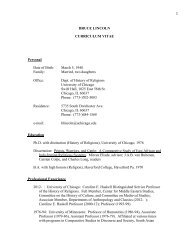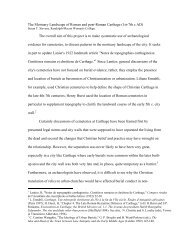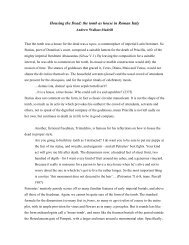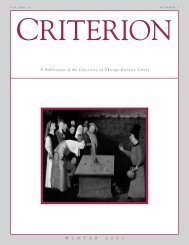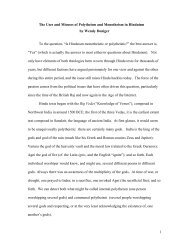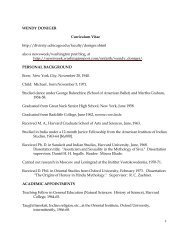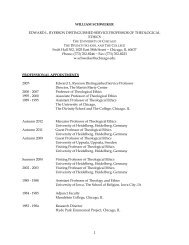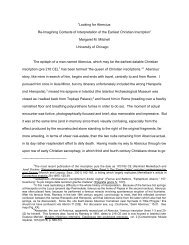The Reification of Evil and The Failure of Theodicy: The Devil in ...
The Reification of Evil and The Failure of Theodicy: The Devil in ...
The Reification of Evil and The Failure of Theodicy: The Devil in ...
Create successful ePaper yourself
Turn your PDF publications into a flip-book with our unique Google optimized e-Paper software.
<strong>and</strong> diverse creatures, that what was want<strong>in</strong>g to one <strong>in</strong> the representation <strong>of</strong> the div<strong>in</strong>e<br />
goodness might be supplied by another. For goodness, which <strong>in</strong> God is simple <strong>and</strong><br />
uniform, <strong>in</strong> creatures is manifold <strong>and</strong> divided <strong>and</strong> hence the whole universe together<br />
participates the div<strong>in</strong>e goodness more perfectly, <strong>and</strong> represents it better than any s<strong>in</strong>gle<br />
creature whatever.<br />
<strong>The</strong>se ideas might or might not co<strong>in</strong>cide with anyth<strong>in</strong>g Dostoevsky might have written on<br />
the topic – which, <strong>of</strong> course, he would not have, s<strong>in</strong>ce he was not a theorist or a systematic<br />
theologian. However important the exact formulation <strong>of</strong> the notion <strong>of</strong> participation may be to<br />
systematic theology, this is not so important for the present purpose. Suffice it to say that I am<br />
<strong>in</strong>terpret<strong>in</strong>g Smerdyakov’s murder <strong>of</strong> Fyodor Pavlovich as what is left to an angry atheist who<br />
cannot experience <strong>and</strong> (eventually) overcome his desire to kill God.<br />
13 In describ<strong>in</strong>g the status <strong>of</strong> lepers <strong>and</strong> lazar houses <strong>in</strong> Europe <strong>of</strong> the High Middle Ages, Michel<br />
Foucault notes:<br />
“If the leper was removed from the world, <strong>and</strong> from the community <strong>of</strong> the Church visible,<br />
his existence was yet a constant manifestation <strong>of</strong> God, s<strong>in</strong>ce it was a sign both <strong>of</strong> His<br />
anger <strong>and</strong> His grace: ‘My friend,’ says the ritual <strong>of</strong> the Church <strong>of</strong> Vienne, “it pleaseth the<br />
Lord that thou should be <strong>in</strong>fected with this malady, <strong>and</strong> thou hast great grace at the h<strong>and</strong>s<br />
<strong>of</strong> Our Lord that He desireth to punish thee for thy <strong>in</strong>iquities <strong>in</strong> this world.’” (Madness<br />
<strong>and</strong> Civilization, p6)<br />
Applied to <strong>The</strong> Brothers Karamazov, mutatis mut<strong>and</strong>is, one can say that Dmitri, Ivan, <strong>and</strong> even<br />
Alyosha struggled with the worldly signs <strong>of</strong> their separation from God, even railed angrily at<br />
God, but not so for Smerdyakov. His mockery <strong>of</strong> religion began <strong>in</strong> his boyhood, <strong>and</strong> never<br />
ceased; he was excluded from the City <strong>of</strong> God not only by circumstances, but also by his own<br />
volition. Ivan, perhaps, wanted to kill God the Father “<strong>in</strong> his heart”, but could not; but<br />
Smerdyakov – spiritually desolate, genu<strong>in</strong>ely not believ<strong>in</strong>g <strong>in</strong> God – <strong>in</strong> his muddleheaded<br />
resentment, killed the only father he knew.<br />
14 <strong>The</strong> elided part <strong>of</strong> this passage <strong>in</strong>cludes Grigory’s castigation <strong>and</strong> Smerdyakov’s response to it:<br />
“‘He doesn't like us, the monster,’ Grigory used to say to Marfa Ignatievna, ‘<strong>and</strong> he<br />
doesn’t like anyone. You th<strong>in</strong>k you’re a human be<strong>in</strong>g?’ he said, address<strong>in</strong>g Smerdyakov<br />
directly. ‘You're not a human be<strong>in</strong>g. You were begotten <strong>of</strong> the bathhouse slime, that’s<br />
who you are… ’ Smerdyakov, it turned out, could never forgive him those words.” (BK,<br />
p. 124)<br />
Thus, the narrator, who should not simply be identified as Dostoevsky, but rather is another<br />
character <strong>in</strong> the novel, concludes that Smerdyakov’s resentment arose as a direct result <strong>of</strong><br />
awareness <strong>of</strong> his low birth. Aga<strong>in</strong>, while illegitimacy <strong>and</strong> other aspects <strong>of</strong> his social status<br />
played a role <strong>in</strong> his resentments, they cannot tell the whole tale. If they did, how could we<br />
expla<strong>in</strong> the lack <strong>of</strong> resentment <strong>in</strong> a character like Smerdyakov’s mother, Lizaveta?




